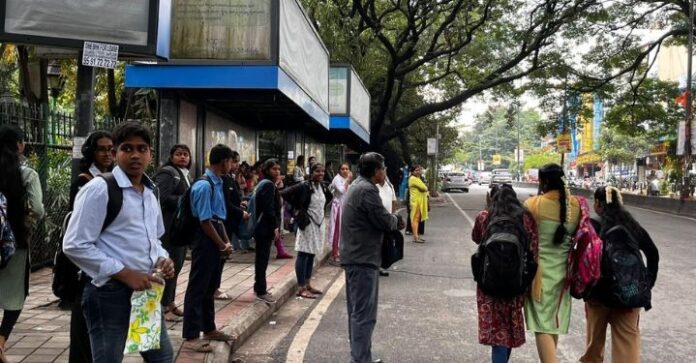In a major relief to lakhs of commuters across Karnataka, the indefinite strike launched by the employees of Karnataka’s Road Transport Corporations (RTC) was called off on Monday evening, just hours after it was initiated. The decision followed strong intervention by the Karnataka High Court and mounting public pressure, which prompted union leaders to back down from their protest.
The sudden strike—announced late Sunday night—paralysed bus operations across major cities and rural routes, catching both the public and the administration off guard. However, with the strike now suspended, services are expected to resume in a phased manner by late Monday night or early Tuesday morning.
High Court Issues Stern Warning
The turning point came when the Karnataka High Court took serious note of the strike, calling it a violation of the Essential Services Maintenance Act (ESMA). The court warned union leaders of legal action, including arrest and contempt proceedings, if they continued the protest.
A bench led by Chief Justice Vibhu Bakhru observed that the strike was not only illegal under ESMA but also detrimental to the daily lives of thousands who rely on state-run transport services for work, education, and healthcare.
Union representatives were summoned and, after hours of legal consultations, they formally announced the strike was being called off. “We are respecting the directions of the Hon’ble High Court and suspending the protest for now,” said Anantha Subbarao, President of the joint action committee representing RTC employees.
Strike’s Sudden Start Disrupts Normal Life
Although the strike lasted less than 24 hours, its impact was widespread. Services by BMTC, KSRTC, NWKRTC, and KKRTC were hit hard, with less than 50% of buses running in many districts. Bengaluru, Mysuru, Hubballi, Kalaburagi, and other cities experienced massive commuter trouble, especially during the morning and evening peak hours.
With buses off the roads, people were forced to rely on Namma Metro, private cabs, autorickshaws, and carpooling. This led to surge pricing on app-based taxi platforms and long queues at metro stations like Majestic and Baiyappanahalli.
For many daily wage workers and students, the transport crisis led to missed workdays and cancelled plans. “I waited over an hour for a bus that never came. Then I had to spend ₹300 on a cab to reach the office,” said a tech worker in Bengaluru’s Electronic City.
Demands at the Heart of the Protest
The employees’ unions had pressed for several long-pending demands, which they claim have been ignored despite repeated representations. Their main demands included:
- Payment of 38 months’ pending salary arrears, estimated at around ₹1,800 crore
- Implementation of new wage revision effective from January 2024
- 25% increase in the base salary
- Reimbursement of losses incurred under the free travel “Shakti” scheme for women
- Withdrawal of disciplinary actions and FIRs filed against protesting workers in the past
The state government, however, has offered to pay only 14 months of arrears, citing fiscal constraints. It has argued that fulfilling all demands would put undue pressure on the state’s transport finances and may set a precedent for other government departments.
Government’s Response and Preparations
As the strike unfolded, the Karnataka government acted swiftly by invoking ESMA and ordering employees back to duty. Chief Minister Siddaramaiah called the strike “unwarranted and illegal,” stating that the government was open to dialogue but would not tolerate disruption of public services.
Deputy Chief Minister D.K. Shivakumar and Transport Minister Ramalinga Reddy held a series of emergency meetings and also appealed to employees to return to work. Over 30,000 private vehicles were temporarily authorised to operate as public transport to help ease commuter hardship.
Companies in the IT sector and other industries were urged to allow work-from-home to reduce pressure on the limited transport facilities.
Partial Restoration Already Underway
Following the call-off announcement, the RTCs began mobilising employees and restarting bus operations. In many districts, limited services resumed Monday evening, especially in Bengaluru and Mysuru. Full-fledged service is expected to be restored by Tuesday morning, according to KSRTC officials.
A BMTC spokesperson said: “We are contacting drivers and conductors who stayed away today. We expect to restore over 90% of services by Tuesday peak hours.”
The Transport Department is closely monitoring the situation and has asked divisional controllers across the state to ensure availability of staff and proper coordination for route management.
What Happens Next?
While the strike has been suspended, the core issues remain unresolved. The High Court has scheduled the next hearing for August 7, and has directed both the unions and the state government to resume negotiations in good faith.
Union leaders have maintained that the protest is only postponed, not withdrawn. “We have not given up our demands. We are honouring the court’s order but expect the government to come to the table with concrete solutions,” said Subbarao.
The state government, too, has shown willingness to engage. “We will talk to union representatives. We are committed to protecting workers’ rights without compromising public interest,” said Transport Minister Ramalinga Reddy.
Political Underpinnings?
Opposition parties have accused the Congress-led government of mismanaging employee relations. The BJP claimed the current administration had failed to honour earlier promises made to RTC employees and demanded a white paper on the financial status of the transport corporations.
However, Congress leaders countered that the transport corporations were already operating under significant fiscal strain due to welfare schemes like free travel for women, which had reduced direct revenue substantially.
Conclusion
The sudden suspension of the Karnataka RTC bus strike has provided temporary relief to citizens, but the root issues of employee arrears, salary revision, and financial viability of the state’s transport system remain to be addressed. All eyes are now on the upcoming negotiations and the High Court hearing scheduled later this week.

